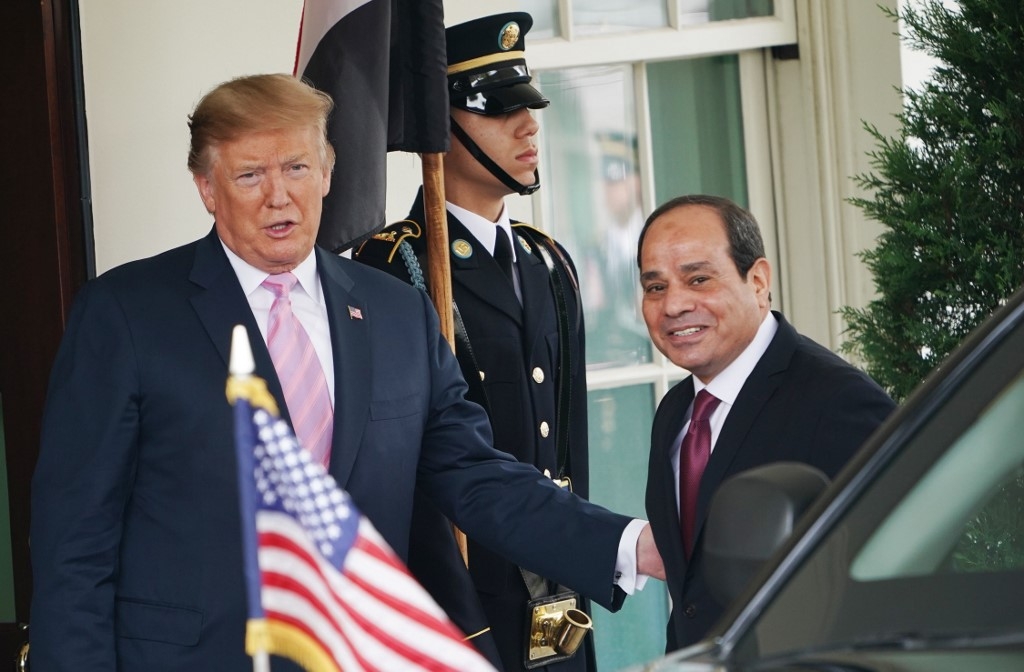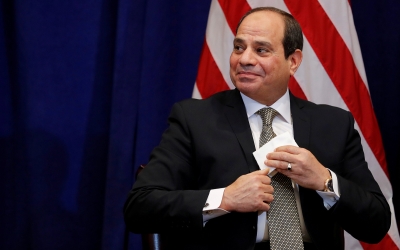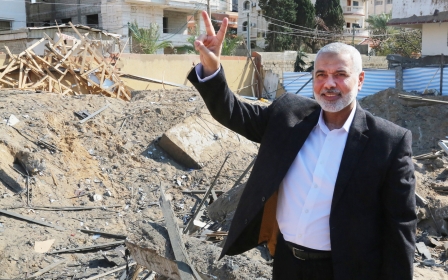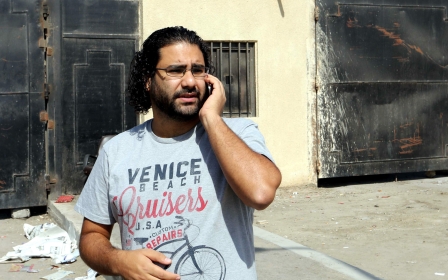With Sisi in Washington, Egyptian-Americans urge Trump to stop 'supporting a dictator'

Ahmed Abdel-Basit knows that advocacy can spark change in the United States.
In fact, it was the public outcry, following the Egyptian activist's detention by US immigration authorities last year, that helped him eventually secure asylum in the country.
Now Abdel-Basit is joining Egyptians across America to push the US government to rethink its support for Egypt's Abdel Fattah el-Sisi, whose government has carried out a brutal crackdown on dissent.
"If they are to turn a blind eye to Sisi as a dictator," Abdel-Basit told Middle East Eye, "the US administration should at least pay attention to all the clear human rights violations happening in Egypt - the arrest of activists, journalists, lawyers, artists, students and professors, and the arbitrary executions in politicised cases."
Stay informed with MEE's newsletters
Sign up to get the latest alerts, insights and analysis, starting with Turkey Unpacked
Egyptian and Egyptian-American activists have long sought to raise concerns about Cairo's human rights abuses in the halls of power in the US capital.
If they are to turn a blind eye to Sisi as a dictator, the US administration should at least pay attention to all the clear human rights violations happening in Egypt
- Ahmed Abdel-Basit, Egyptian activist
Last month, dozens of activists met with representatives in Congress for Egypt Advocacy Day, an event organised by the Freedom Initiative rights group that is devoted to drawing US politicians' attention to the Egyptian government's silencing of all forms of opposition.
But those efforts have intensified ahead of Sisi's visit on Tuesday to Washington where he met with US President Donald Trump.
During the meeting, Trump praised the Egyptian leader, despite widespread criticism over Sisi's human rights record, AFP news agency reported.
"I think he is doing a great job," Trump said as he sat down for talks with Sisi in the White House. "We have never had a better relationship between Egypt and the United States than we do right now."
Trump's comments were predicted by critics, who opposed the meeting, calling it a strategical move by Sisi to seek tacit backing for a string of constitutional amendments that would allow him to stay in power until 2034.
The meeting between the two leaders, who have pushed decades of strong US-Egypt ties to new heights, is the latest example of how the Trump administration has emboldened repression in Egypt, activists and experts have said.
But with the country receiving billions of dollars from the US government every year, activists say Washington should be pressuring Sisi to respect human rights.
Personal experiences
Abdel-Basit, who now lives in New Jersey, told MEE he uses his personal experience to show US officials just how severe Egyptian government oppression can be.
In 2015, he was fired from his job at Cairo University, where he taught physics, for denouncing the detention of student activists.
After leaving the country, he was charged with financing a militant cell - an accusation he says is fabricated - and sentenced to death.
"As someone who's been sentenced to death myself, I shared my story with [US officials] to demonstrate how these death sentences that Egyptian courts are handing [out] are based on trumped up charges without the basics of justice or due process," Abdel-Basit told MEE.
His own ordeal in the US hasn't deterred him from appealing to American lawmakers, either.
Last year, Abdel-Basit was arrested by Immigration and Customs Enforcement (ICE) agents who he said were tipped off by the Egyptian embassy.
The US immigration officials had sought to deport him from the country, but after a public advocacy campaign, a judge granted him asylum.
Egypt's proposed constitutional amendments
+ Show - HideThe Egyptian parliament has approved 15 constitutional amendments that would strengthen the military's grip on power and open the door for President Abdel Fattah el-Sisi to stay in power until 2034.
The overwhelming majority of lawmakers approved the proposed changes in February, moving them to a legislative committee which was tasked with submitting a final draft to Sisi within 60 days.
After the president agrees to the amendments, he has one month to call a popular referendum to certify them into law.
The most controversial of the proposed amendments would extend the president's term from four to six years.
While the proposal still limits presidents to two terms in office, a "transitional clause" allows the "current president" to run for two six-year terms after the end of his current mandate in 2022.
That effectively enables 64-year-old Sisi, who became president in 2014, to remain in power until age 79.
The changes would also expand the president’s powers, granting him oversight of the judiciary - a scheme rejected by human rights advocates as a blatant violation of the separation of powers.
One amendment calls for establishing a "supreme council for judicial committees" that would be headed by the president, while other proposed changes give the president the authority to appoint the public prosecutor and the chief of the Supreme Constitutional Court.
The amendments would also codify the role of the army in the state, calling the military the protector "of the constitution, democratic principles and civil state".
While the description is vague, critics say they fear that provision will allow the army broad overreach.
They pointed to a recent episode in which the military forcefully interfered in politics under the guise that it was protecting democracy; in 2013, the Egyptian army toppled Egypt's democratically elected president, Mohamed Morsi, after large protests against his rule.
Sisi, who was defence minister and the top general at the time, led the coup before assuming power and ascending to the presidency.
Another proposed amendment allows the Supreme Council of the Armed Forces, an influential body of top army generals, to approve the appointment of the defence minister.
Other changes encourage inclusion and diversity in politics, including a proposal for a 25 percent quota for women in parliament.
According to Abdel-Basit, the Egyptian authorities have a "template" of charges they levy against perceived opposition activists, including "joining a terrorist group" and plotting against the state.
Indeed, since Sisi toppled Egypt's first democratically elected president Mohamed Morsi in a 2013 coup, the authorities have arrested more than 50,000 people for suspected political activities, human rights groups estimate.
Designating the Muslim Brotherhood, Morsi's Islamist party, a terrorist group made it even easier to level charges of militancy against the government's perceived opponents, including secular and liberal activists.
The breadth of that campaign of repression has not spared people of any age or gender.
'A difficult journey'
But despite myriad reports about human rights abuses and politically motivated arrests in Egypt, activists say it remains a struggle to get the Trump administration to take up the cases of their detained loved-ones.
Last December, Ahmed Mahmoud and his wife Raia Hassan, both in their early 60s, were arrested at Cairo airport along with their daughter as they were boarding a flight to Turkey.
While their daughter was released within a month, Mahmoud and Hassan remain in jail, detained without charges or the prospect of a fair trial.
I am an American citizen and my family is paying taxes to imprison my parents
- Sohayla Mahmoud, US-based activist
For months now, they have been physically tortured, mentally abused and deprived of needed medical care, according to the couple's US-based daughters, Sohayla Mahmoud and Nosayba Mahmoud.
Sohayla and Nosayba told MEE that their parents participated in the 2011 revolution and organised charitable efforts to help the poor, but they haven't been politically active for years.
The sisters, both US citizens, are now reaching out to US lawmakers and Trump administration officials to bring awareness to the plight of their parents, as well as other political prisoners in Egypt.
They took part in Egypt Advocacy Day last month, raising their parents' case in meetings with their representatives in Congress and US State Department officials. Nosayba said they are working with activists they met during that event, too.
"We want to create pressure through Congress to maybe put a demand on the administration to condition the aid to Egypt on my parents' release," Sohayla said. "That's the final goal. How we reach that? It's been a difficult journey from what we've seen so far."
Funding a dictatorship
But Egypt receives $1.3bn in military aid annually from the US, making it one of the largest recipients of American military assistance in the world, and US government support for Sisi appears unchanging.
In fact, ahead of Sisi's visit to Washington this week, the Trump administration praised Cairo for its "longstanding role as a lynchpin of regional stability".
In a statement, the US president's press office said Washington's focus remains on "strengthening the strategic partnership between the United States and Egypt and building on our robust military, economic, and counterterrorism cooperation".
Still, members of Congress have been calling on the US government to use the leverage it gets from its aid package to Egypt, to pressure Cairo to respect human rights.
On Monday, 17 senators from both major US parties wrote a letter to Secretary of State Mike Pompeo expressing "serious concern about the erosion of political and human rights" in Egypt ahead of Sisi's visit.
Sohayla said Americans' tax dollars should not be funding a military dictatorship.
"I am an American citizen and my family is paying taxes to imprison my parents," she told MEE.
Aayah Hosam, a US citizen from the northwestern state of Washington, has been fighting a similar battle for about two years.
Her parents were arrested in Egypt in June 2017. They, too, have been mistreated in prison and denied their due process as Egyptian state prosecutors continue to routinely renew their detention without presenting formal charges against them.
Hosam's mother, Ola, is the daughter of outspoken Qatar-based imam Youssef al-Qaradawi.
Over the past two years, Hosam has sought support from dozens of members of Congress, contacted State Department officials, and organised a public awareness campaign to try to get her parents out of prison.
Trump and the White House [need] to take a stand and say: 'You know what, if you want your aid, if you want us to be your allies, you do have to do these things that we've asked you'
- Aayah Hosam, activist whose parents are detained in Egypt
She said Trump, at the very least, must push Sisi this week to free Egyptians with connections to the US - like her parents.
Without that pressure, Hosam added that Sisi's abuses would continue.
"It's not right for the US to support a dictator who's detaining and killing people in [the] thousands," Hosam told MEE.
"Trump and the White House [need] to take a stand, and say: 'You know what, if you want your aid, if you want us to be your allies, you do have to do these things that we've asked you'," she said.
Abdel-Basit echoed her comments, saying that Trump should press Sisi for some reforms.
"We know that Trump will not cut ties with Sisi or end the aid to Egypt. We are realistic. But if he can push for releasing a number of political prisoners or halting executions, it would be a success for us as activists abroad," he said.
"It would also help the US image with Egyptians as a country of freedoms that rejects human rights abuses."
'Right to advocate'
While activists like Abdel-Basit may view their advocacy as an act of patriotism, Egyptian media outlets, which are tightly controlled by the government, have hit back at him and others, calling them "traitors" and accusing them of engaging in anti-Egypt incitement in a foreign country.
Award-winning movie stars Amr Waked and Khaled Abol Naga, who participated in the Egypt Advocacy Day, were expelled from the country's Actors' Union, which accused them of "high treason" last month.
"Photo shows Amr Waked with the terrorist Ahmad Abdel-Basit," a headline in a pro-government news website proclaimed at the time.
Abdel-Basit ridiculed the accusations, saying that since the coup, the state has been assigning absurd labels to critics who dare to express their opinions in public.
"'High treason' - that's someone who gave away the army's top secrets to another country, or someone who let the enemy invade his land, or may be someone who sold two islands to another state," Abdel-Basit said in a subtle rebuke of Sisi, who ceded control of two strategic Red Sea islands to Saudi Arabia in 2017.
For her part, Hosam said she wouldn't have to knock on the doors of US lawmakers if Egypt was treating its citizens with dignity and respect.
"If my country was fair to me, I wouldn't advocate against it in any place in the world," Hosam told MEE. "But if you're not allowing me any legal place to get my freedom or [to] get my parents' freedom, then it's my right to advocate in any country that I want."
She said that Washington's special relationship with Cairo makes the US an ideal place from which to call for freedom in the North African country.
"We're talking about the country that's giving Egypt billions of dollars a year in aid," she said. "So why shouldn't I use that leverage?"
Middle East Eye delivers independent and unrivalled coverage and analysis of the Middle East, North Africa and beyond. To learn more about republishing this content and the associated fees, please fill out this form. More about MEE can be found here.






